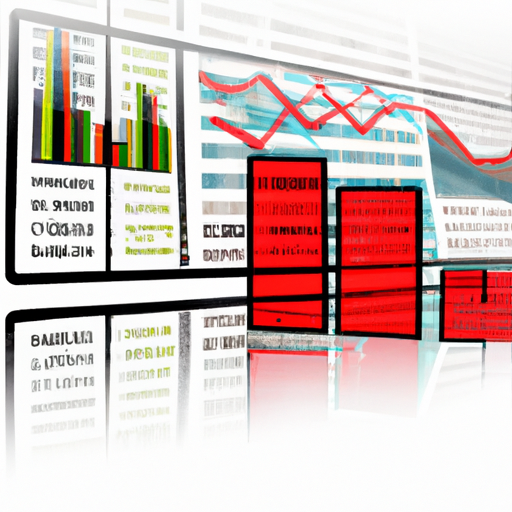Accounting Industry Trends
You’re about to embark on a journey into the ever-evolving world of the accounting industry. Get ready to uncover the latest trends shaping this dynamic field as we delve into the exciting landscape of accounting industry trends. From technological advancements to shifting regulatory landscapes, this article unravels the emerging practices and transformative forces that hold the key to success and growth in the fast-paced world of accounting. So, fasten your seatbelt and brace yourself for an insightful exploration of the accounting industry trends that are shaping the businesses of today and tomorrow.

Table of Contents
Emergence of Artificial Intelligence in Accounting
Artificial Intelligence (AI) has made remarkable advancements in recent years, and its impact on the accounting industry is becoming increasingly evident. One of the key benefits of AI in accounting is the automation of repetitive tasks. By utilizing AI-powered software, mundane and time-consuming activities such as data entry, invoice processing, and payroll management can now be performed with minimal human intervention. This allows accountants to focus on more strategic and value-added activities, ultimately improving overall efficiency and productivity.
Furthermore, AI has proven to enhance accuracy in accounting processes. With its ability to analyze vast amounts of data quickly and accurately, AI can identify errors and inconsistencies that may go unnoticed by human accountants. This not only reduces the risk of human error but also ensures that financial information is reliable and accurate. Additionally, AI-powered software can provide real-time insights and recommendations, enabling accountants to make more informed and data-driven decisions.
Shift towards Cloud-Based Accounting Systems
Cloud-based accounting systems have gained significant traction in recent years, revolutionizing the way finance and accounting functions are performed. One of the primary advantages of these systems is the real-time access to financial information. Instead of relying on traditional on-premises servers, cloud-based platforms allow accountants and businesses to access their financial data anytime, anywhere. This allows for better collaboration between accountants and their clients, as information can be shared and updated in real-time, improving efficiency and reducing delays.
Moreover, cloud-based accounting systems offer enhanced data security. Data breaches and cyber threats have become major concerns in the digital age, and traditional storage methods often fall short in ensuring robust protection. By utilizing cloud technology, sensitive financial information is stored securely in data centers, which often have advanced security measures in place, including encryption and regular backups. This provides peace of mind to accountants and their clients, knowing that their data is safe from potential breaches or loss.

Increased Focus on Cybersecurity
With the exponential growth of digital transactions and the increasing reliance on technology, the accounting industry has become a prime target for cyber attacks. Hackers are continually finding new ways to infiltrate systems and steal sensitive financial information. As a result, there has been a heightened focus on implementing robust cybersecurity measures.
To combat this growing threat, accounting firms and businesses have started investing heavily in cybersecurity infrastructure. This includes implementing firewalls, intrusion detection systems, and strong encryption protocols to protect financial data. Additionally, continuous monitoring and regular penetration testing are conducted to identify vulnerabilities and address them promptly. By prioritizing cybersecurity, the accounting industry can strengthen the protection of financial data and safeguard the trust and confidence of clients.
Expansion of Data Analytics
Data analytics has become an indispensable tool in today’s accounting landscape. With the massive amount of data generated by businesses, accountants can leverage advanced analytics techniques to gain valuable insights and make more informed decisions. By utilizing big data analytics, accountants can identify trends, patterns, and anomalies that traditional methods may overlook.
One of the key areas where data analytics proves invaluable is in predictive analysis for better financial planning. By leveraging historical data and applying predictive models, accountants can forecast future trends, potential risks, and opportunities. This allows businesses to make proactive decisions and develop strategies that have a higher likelihood of success.
Additionally, data analytics plays a crucial role in fraud and risk management. By analyzing data patterns and anomalies, accountants can detect potential fraudulent activities and implement appropriate controls. This enhances organizations’ ability to mitigate risks and prevent financial losses arising from fraudulent activities.

Integration of Blockchain Technology
Blockchain technology, originally developed for cryptocurrencies such as Bitcoin, has found numerous applications in the accounting industry. One of the key advantages of blockchain technology is its ability to provide enhanced transparency and traceability. By utilizing a decentralized and immutable ledger, accountants can ensure that financial transactions are securely recorded and cannot be altered without detection.
Furthermore, blockchain technology streamlines auditing and compliance processes. With a transparent and tamper-proof ledger, auditors can access financial records directly from the blockchain, eliminating the need for extensive manual reviews. This increases audit efficiency and reduces the risk of errors or discrepancies.
Another benefit of blockchain technology is its ability to simplify and secure transactions. Through smart contracts, which automatically execute predefined conditions, financial transactions can be conducted seamlessly and securely. This eliminates the need for intermediaries, reduces transaction costs, and minimizes the risk of fraud.
Rise of Remote Work and Virtual Accounting
The advent of technology has fueled the rise of remote work and virtual accounting. With the availability of cloud-based accounting systems and secure online communication tools, accountants now have the flexibility to work remotely and collaborate seamlessly with clients and colleagues.
Remote work offers numerous benefits for both accountants and accounting firms. It allows for a better work-life balance, as accountants can work from anywhere and at any time. This flexibility can lead to increased job satisfaction and productivity. Additionally, remote work eliminates the need for a physical office, resulting in reduced overhead costs for accounting firms.
Moreover, virtual accounting opens up access to a global talent pool. Accounting firms can now recruit and work with talented professionals from around the world, without being limited by geographical boundaries. This allows for diverse skill sets and expertise, ultimately enriching the accounting industry as a whole.
Greater Emphasis on Sustainability Reporting
With the increasing focus on environmental and social responsibility, there has been a corresponding demand for companies to disclose their sustainability efforts. Sustainability reporting goes beyond traditional financial reporting, incorporating environmental, social, and governance (ESG) factors into financial statements. Accountants play a crucial role in integrating sustainability into financial reporting frameworks, ensuring transparency, and accountability.
By adopting sustainability reporting, companies can demonstrate their commitment to sustainable practices and responsible business operations. This enhances stakeholder trust and enables investors and consumers to make more informed decisions. Accountants, therefore, need to stay abreast of sustainability reporting frameworks and provide accurate and reliable information that reflects companies’ sustainability performance.
Adoption of Robotic Process Automation
Robotic Process Automation (RPA) involves the use of software robots to automate repetitive and rules-based tasks. In the accounting industry, RPA is particularly valuable for tasks such as data entry, transaction processing, and report generation. By automating these high-volume and time-consuming tasks, accountants can significantly improve efficiency and accuracy.
RPA eliminates the need for manual data entry, reducing the risk of errors. Software robots can extract data from various sources, input it into accounting systems, and perform calculations accurately and consistently. This not only saves time but also eliminates the potential for human error in repetitive tasks.
Furthermore, RPA enables cost savings for accounting firms. By automating tasks that were previously performed by humans, firms can reallocate resources to value-added activities and reduce overall operational costs. Additionally, the scalability of RPA allows firms to handle higher volumes of work without increasing their workforce.
Transition towards Real-time Financial Reporting
Traditional financial reporting often involves significant delays between the end of a reporting period and the availability of the financial statements. However, with advances in technology and the availability of real-time financial data, the accounting industry is shifting towards real-time financial reporting.
Real-time financial reporting offers several advantages. Firstly, it provides timely availability of financial information, enabling accountants and stakeholders to make informed decisions based on up-to-date data. This is particularly crucial in fast-paced industries where real-time financial insights are vital for strategic planning and decision-making.
Secondly, real-time financial reporting ensures compliance with regulatory requirements. By continuously monitoring and reporting financial data, companies can avoid penalties and non-compliance issues. Furthermore, real-time reporting enhances transparency and accountability, as stakeholders have access to accurate and reliable financial information whenever they need it.
Growth of Outsourcing and Niche Accounting Services
Outsourcing has become an increasingly popular option for accounting firms and businesses seeking cost-effective solutions. Small businesses, in particular, benefit from outsourcing their accounting and finance functions, as it allows them to access specialized expertise without incurring the costs associated with hiring additional staff.
Outsourcing also enables accounting firms to focus on their core competencies. By delegating non-core functions to external service providers, firm resources can be directed towards value-added activities such as financial analysis, strategic planning, and client relationships. This not only enhances the firm’s overall efficiency but also improves client satisfaction.
Furthermore, the accounting industry has seen the growth of niche accounting services. As businesses become more specialized and face complex financial challenges, there is a demand for specialized expertise in areas such as tax planning, forensic accounting, and international accounting standards. Niche accounting firms, driven by their deep knowledge and experience, can provide tailored solutions to address these specific requirements.
In conclusion, the accounting industry is undergoing significant transformations driven by technological advancements and changing business demands. From the emergence of artificial intelligence to the rise of remote work and the adoption of robotic process automation, these trends are reshaping the way accounting functions are performed. By embracing these changes and leveraging technology, accountants and accounting firms can stay ahead of the curve, enhance efficiency, and provide valuable insights to drive business growth.






